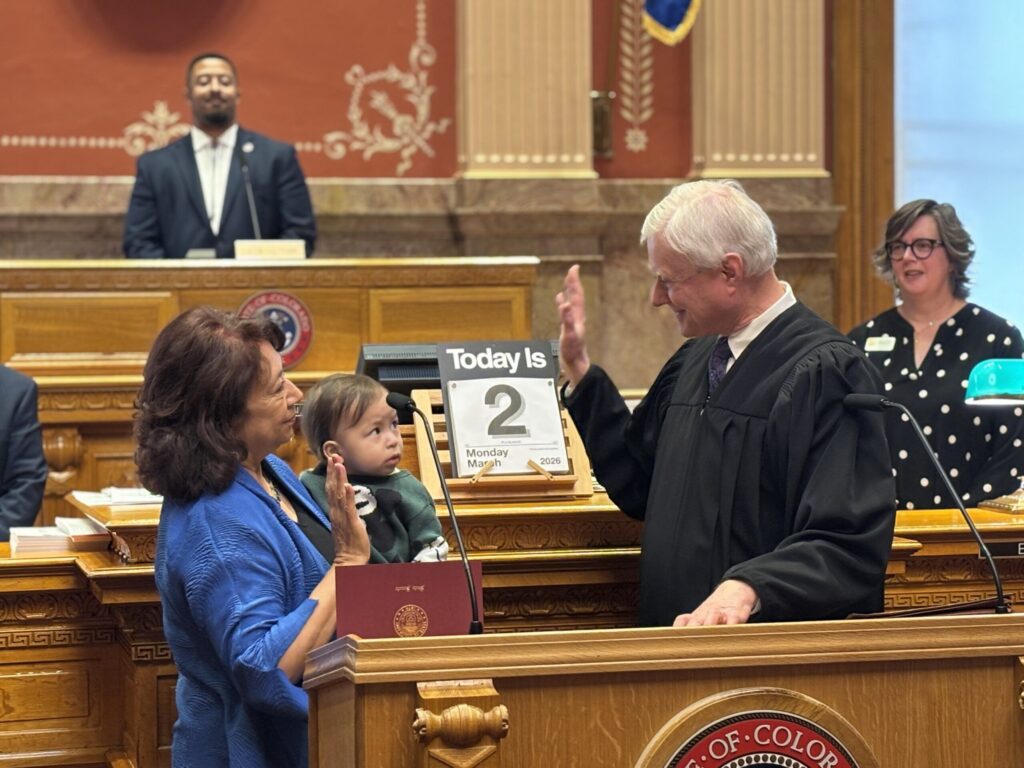‘Fair scheduling’ bill pits Colorado’s progressive legislators against business interests

In industries such as restaurant, retail and construction, it’s known as “show-up time:” An employee shows up to work as scheduled, but is sent home because there isn’t enough work that day.
The employee only gets paid for actual time worked, and if sent home, that can be a day’s pay lost.
A measure expected to be introduced imminently in the state House, backed by some of the General Assembly’s most progressive Democratic lawmakers, would require almost every food and beverage or retail business in the state to pay those employees “predictability pay” when they are sent home and don’t work the scheduled hours.
Loren Furman, president of the Colorado Chamber of Commerce said the bill raises big concerns for her members.
According to the Colorado Department of Labor and Employment, state wage laws currently do not require an employer pay an employee for “show-up time.”
Employers are only required to pay employees for actual time worked, services rendered, or the time during which the employee was permitted to work. Wage laws also do not require employers to provide a certain amount of hours of work. If an hourly employee, for example, “shows up as scheduled for an 8-hour shift, only works for one hour and is then immediately sent home as directed by the employer, the employee is only owed for the one hour of actual work,” CDLE says.
The “Fair Workweek Employment Standards” bill intends to address that issue. It’s sponsored by Denver Democratic Rep. Emily Sirota and Sen. Julie Gonzales, as well as Sen. Faith Winter of Westminster and has the support of a number of unions, including Colorado AFL-CIO, SEIU Local 105 and Colorado WINS.
A draft obtained by Colorado Politics and slated to be introduced this week says the measure will apply to a broad range of businesses. Covered employers include those primarily engage in food or beverage, retailers with 250 or more employees worldwide, janitorial or security contractors, and those that provide food and beverage contract services in hotels, motels, amusement parks, casinos, schools and institutions of higher ed, civic and social organizations, and businesses that fall under the 2022 North American Industry Classification System sectors 31 to 33. That includes almost everything else: businesses where food or beverages are prepared, packaged, processed or manufactured and that engage in retailing miscellaneous specialized lines of merchandise, which can includes retailers of electronics, appliances, home furnishings, health and personal care products, gas stations, bookstores and news dealers, sporting goods, musical instruments retailers, pet supplies, mobile home dealers, cemetery memorial dealers, swimming pools sales and flower shops.
It also applies to “chain” businesses, even if that chain has just a handful of employees in Colorado but 250 employees or more outside of Colorado.
Under the measure, employers would have to provide schedules 14 days in advance, at least 12 hours of rest time between shifts, and offer more hours to part-time workers before hiring new ones.
Agriculture appears to be the only exempted industry in the bill.
Sirota told Colorado Politics Thursday the bill will address the unpredictability in scheduling that occurs in retail and food service sectors.
“We know from research across the country and from workers in Colorado, that in these sectors the unpredictable nature of schedule leads to extreme income volatility, negative health impacts, negative impacts on children. What we’re proposing here is that large businesses work with their employees to ensure more predictable schedules, thus more predictability in incomes. We see this as a win-win,” she said.
A study by Harvard’s Kennedy Shift Project showed unpredictable and unstable schedules “lead to higher employee turnover, household economic insecurity, and reductions in workers’ health and wellbeing,” and that was aggravated during the pandemic, particularly for people of color.
That unpredictability also extends to the workers’ children, who may experience emotional distress, more absences from school and sleep disruptions, the study said.
The efforts to address fair work schedules has taken hold in a few, largely Democratic-led locales. Oregon has a statewide law, as do the cities of Seattle, New York City, Philadelphia, San Francisco, San Jose, Chicago and Emeryville, California, according to the HR company Workforcehub.com.
So far, Workforcehub.com said these laws appear to apply only to retail, hospitality and food service employers, and many have minimum employee requirements that exclude small business.
Furman raised concern the definition of “chain” in the bill seems to target franchises, which are often locally owned small businesses.
“This is aimed at local small businesses,” she said.
Sirota disagreed.
“If you want to count McDonald’s franchise as a small business, that’s not how we would characterize it,” she said, pointing out those franchisees have access to parent corporation mechanisms, including scheduling tools and algorithms tied to those scheduling tools.
Furman also raised issue with a provision of the bill that prohibits businesses from changing work schedules without first an employee’s consent first, which could include written consent.
“Think of the snowstorm yesterday,” Furman said Thursday. “You can’t anticipate when someone comes into work during a snowstorm. They have to adjust schedules in order to operate, and this will hamper a business’s options for doing that.”
It could also hamper hiring, Furman said. She argued that if a business is already offering a set number of hours to existing employees, that puts a new employee at a disadvantage for hours.
“The bill doesn’t align with what we’ve seen in employment bills in the past,” she said.
Peggi O’Keefe of the Colorado Gaming Association raised industry-specific concerns relating to how the measure could make it harder for casinos to hire.
“We have concerns with the current draft from both an employer and employee perspective,” she told Colorado Politics.
Casinos already have a hard time getting people to drive up the mountains and fill these positions, she said.
“Putting more of an onerous, prescriptive burden on employers puts them in a position where they can’t hire people,” she said, adding the gaming association is working with a coalition of businesses to come up with suggestions for the sponsors on potential solutions.
Kristi Bush, associate general counsel for UFCW Local 7, told Colorado Politics that a franchise, regardless of size if the parent company is larger than 250 employees, is included in the definition. “Our research and studies have shown fair scheduling only helps businesses, not hurt them.” Research shows businesses that use predictive scheduling are 5% more productive and 7% more profitable. It also reduces turnover by 15%, she said.
“Part of what we are excited about is that workers deserve advance notice of their schedules to plan their lives,” Bush said. It builds trust between employer and employee, she added.
Multiple sources have told Colorado Politics the bill does not have any fans in the governor’s office. A Polis spokesman declined to comment on the bill.
In reference to that, Sirota on Thursday stated: “We’ve been working with a number of folks, workers impacted, employers impacted and state agencies, and will continue to have dialogue with folks. At the end of the day, we’re just working to ensure workers have dignity and predictability in the workplace.”
As to the governor’s possible opposition, Sirota indicated she’s talked to the governor’s office: “I’ll continue to commit to the process of working through the bill with everyone.”
An earlier draft of the bill showed as a co-sponsor Rep. Serena Gonzales-Gutierrez, a Denver Democrat who is running for city council. She is no longer on the bill.














